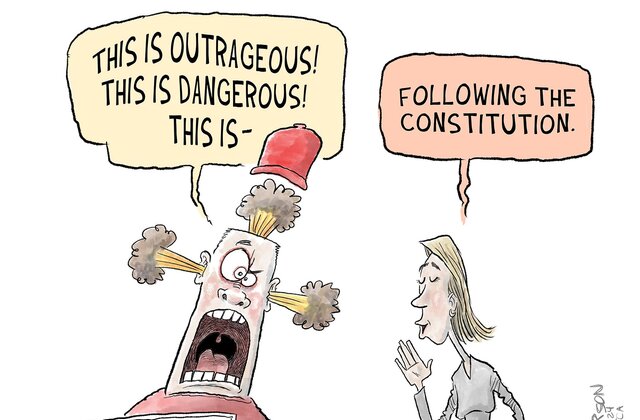[ad_1]
STOCKHOLM (AP) — Sweden’s bid to join NATO — which had been stalled for nearly two years — cleared its next-to-last hurdle when Turkish Parliament gave it the green signal To include the Nordic countries in the alliance.
All existing NATO countries must give their approval before any new member can join the alliance, and Hungary is now the only member that has not given the green light to Sweden.
Here’s a look at Sweden’s complicated path toward NATO membership.
Why does Sweden want to join NATO?
Sweden has stayed out of military alliances for more than 200 years and long refused NATO membership. but after Russia’s full invasion of Ukraine In February 2022, it abandoned its long-term policy of non-alignment almost overnight and decided to apply to join the alliance with neighboring Finland.
political cartoon

Both Sweden and Finland had already developed strong ties to NATO after the end of the Cold War, but public opinion remained against full membership until the war in Ukraine.
Non-alignment was seen as the best way to avoid creating tensions with its powerful neighbor Russia in the Baltic Sea region. But Russian aggression led to dramatic changes in both countries, with polls showing increased support for NATO membership.
Political parties in both Finland and Sweden decided that they needed the security guarantees that only come with full membership in the US-led coalition.
Why is it taking so long?
While Finland became NATO’s 31st member in April last year, Sweden’s application has been blocked by Turkey and Hungary.
To allow Sweden to join, Turkish President Recep Tayyip Erdogan set a number of conditions, including a tough stance towards groups that Turkey considers a threat to its security, such as Kurdish militants and members of a network that Pleads guilty to a failed coup in 2016.
However, the Swedish government tried to appease Erdogan by lifting the arms embargo on Turkey and promising to cooperate fighting terrorismPublic demonstrations by supporters of the banned Kurdistan Workers’ Party, or PKK, and Muslim opponents in Sweden Quran burning activists Complicated the situation.
Pressure from the US and other NATO allies on Turkey to overcome its objections to Swedish membership had little effect until Erdogan said at a NATO summit last year that he would send the documents to parliament for approval. . But the issue remained stalled in Parliament until lawmakers voted on the issue on Tuesday and approved Sweden’s accession protocol by 287 votes to 55.
This leaves Hungary as the final hurdle for Sweden’s NATO bid. Hungary initially gave no clear reason for its delay and Prime Minister Viktor Orbán has long insisted that his country would not be the last to grant its approval to Sweden. But attitudes towards Stockholm hardened last year, when Hungary accused Swedish politicians of telling “sheer lies” about the state of Hungary’s democracy.
Orban, who has broken ties with NATO allies by taking a Kremlin-friendly stance towards Russia’s invasion of Ukraine, said on Tuesday that he Swedish Prime Minister Ulf Christerson invited “Future cooperation in the field of security and defense as allies and partners” will be discussed in Budapest.
Unless an emergency session of the Hungarian parliament is called to debate Sweden’s NATO bid, its next scheduled meeting is expected to be on 26 February.
What will Sweden bring to the alliance?
The inclusion of Sweden would keep the Baltic Sea surrounded by NATO countries, strengthening the alliance in a strategically important region. The Baltic Sea is Russia’s maritime point of access to the city of Saint Petersburg and the Kaliningrad enclave.
Sweden’s armed forces have declined sharply since the Cold War, but are widely seen as a potential boost to NATO’s collective defense in the region. Sweden has a modern air force and navy and has committed to increasing defense spending to reach NATO’s target of 2% of GDP.
Like the Finns, Swedish forces have also been participating in joint exercises with NATO for years.
Not surprisingly, Moscow reacted negatively to Sweden and Finland’s decision to abandon non-alignment and seek NATO membership, and warned of unspecified retaliatory measures.
Russia said the move had an adverse impact on the security situation in Northern Europe, which it said was “previously one of the most stable regions in the world.”
Finland’s security service said in October that the country’s relations with Russia had deteriorated significantly and Moscow now considers its western neighbor an enemy country.
Both Sweden and Finland have warned of Russian interference and the increased risk of hybrid attacks.
Copyright 2024 The associated Press, All rights reserved. This material may not be published, broadcast, rewritten, or redistributed.
[ad_2]
Source link
